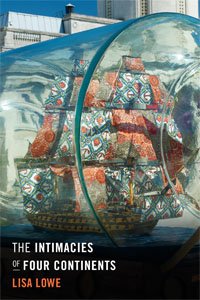This week’s focus is the Coloniality of Power. I begin by establishing what is at stake using Russia’s current war on Ukraine as an example. It has not escaped notice that the approach to the 3 million Ukrainian refugees who have so far fled the country has been markedly different…
Comments closedTag: Coloniality
The Masters of Research course I run at Western Sydney University is back, beginning on July 23. As usual if you want to come along (face-to-face only) or are along with us, you are welcome. Usually, the course has a special theme. In 2019 that was ‘racial capitalism’. This year…
Comments closedUPDATE: You can now watch a recording of this event here I will be speaking online about ‘Antisemitism and the Proxification of Antiracism’, the subject of the 4th chapter of Why Race Still Matters to the University of Edinburgh Race.Ed seminar series on February 17. The political utility of antisemitism…
Comments closed Lisa Lowe‘s 2015 book, The Intimacies of Four Continents, is the impetus for this week’s blog, the fifth in my Race Critical and Decolonial Sociology series. This groundbreaking work challenges us to unread standard accounts of the development of capitalist modernity and political liberalism. It does not do this only by inserting race, gender and the colonial in order to disrupt these standard accounts. While this work is vital, Lisa Lowe goes several steps further. She reorients official histories by reading the archives against each other and juxtaposes this archaeological work with an unreading of standard texts from literature, autobiography and political philosophy. The Intimacies of Four Continents is not the kind of book that sociologists are used to reading, but neither is it a standard work of history, literature or philosophy as it is profoundly interdisciplinary. The book is an example par excellence of what a relational, interactive or connected account looks like, taking us several steps deeper into the discussion, begun in blogs 3 and 4, about the methodological and epistemological challenges of doing sociology with a truly global orientation.
Lisa Lowe‘s 2015 book, The Intimacies of Four Continents, is the impetus for this week’s blog, the fifth in my Race Critical and Decolonial Sociology series. This groundbreaking work challenges us to unread standard accounts of the development of capitalist modernity and political liberalism. It does not do this only by inserting race, gender and the colonial in order to disrupt these standard accounts. While this work is vital, Lisa Lowe goes several steps further. She reorients official histories by reading the archives against each other and juxtaposes this archaeological work with an unreading of standard texts from literature, autobiography and political philosophy. The Intimacies of Four Continents is not the kind of book that sociologists are used to reading, but neither is it a standard work of history, literature or philosophy as it is profoundly interdisciplinary. The book is an example par excellence of what a relational, interactive or connected account looks like, taking us several steps deeper into the discussion, begun in blogs 3 and 4, about the methodological and epistemological challenges of doing sociology with a truly global orientation.
The Intimacies of Four Continents contains so many multiple layers and such a rich account of interrelated histories that I will be unable to do it justice in its entirety here. I wish instead to focus on three aspects of the book: 1) its methodological contribution, which provides a concrete example of what a truly connected scholarship looks like; 2) most significantly for me, its emplacement of race squarely within liberalism; and 3) its insistence on the impossibility of separating an antiracist, anticolonial praxis from these histories and the consequent scholarship. This third point allows me to build on my comments regarding Du Bois’ activism, begun in my last blog, as Lowe uses Du Bois and C.L.R. James’ work as exemplars of what such active scholarship looks like.
Comments closedTonight Free University of Western Sydney is hosting a screening of Concerning Violence, the Goran Olsson film which uses archival footage of anticolonial struggles to contextualise Chapter 1 of Frantz Fanon’s The Wretched of the Earth. Omar Bensaidi and I will be chairing the discussion. Here is the presentation we have prepared with the text below.
My thanks to Michael Richmond of The Occupied Times of London for publishing this short comment on frozen racism, the European abuse of Holocaust memorialisation and the denial of coloniality in the current ‘crisisification’ of the arrival of refugees in Europe. The whole issue is on race with articles by…
Comments closedI was asked to participate in an event recently organised by the Philosophy @ UWS initiative, Encountering the Author, a discussion of Blood: A Critique of Christianity by the Columbia University Professor of Religion and Middle Eastern, South Asian, and African Studies, Gil Anidjar. I could not attend but produced…
Comments closed







